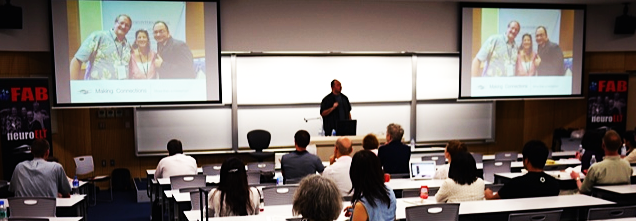
Presentation Guidelines:
How can Neuroscience, Psychology, and English Language Teaching (ELT) inform each other for the benefit of students and teachers? This question is at the core of our FAB conferences. Our understanding of the brain is making advances every day, and yet, few of these advances have yet made an impact on language teaching. We intend to change that. We hope that by providing conferences like this, we can share what we have learned. We encourage teachers to teach themselves about advances in neuroscience, integrate these findings into their understanding of teaching, and teach the rest of us through presentations or conversations at the conference.
How can Neuroscience, Psychology, and English Language Teaching (ELT) inform each other for the benefit of students and teachers? This question is at the core of our FAB conferences. Our understanding of the brain is making advances every day, and yet, few of these advances have yet made an impact on language teaching. We intend to change that. We hope that by providing conferences like this, we can share what we have learned. We encourage teachers to teach themselves about advances in neuroscience, integrate these findings into their understanding of teaching, and teach the rest of us through presentations or conversations at the conference.
Presentation Formats
Topic areas: Any area related to neuroELT. See below for examples.
(Please note: KOTESOL is accepting proposals separately. Apply to one, not both.)
Presentation Length: 20 or 45 minutes.
Presentation Format: Workshop, demonstration, talk, or research report.
Abstract Length: 200-250 words. // Bio-sketch: 75-100 words
Abstracts should be mainly devoted to a precise description of what will be presented and how.
Email proposals as DOCx/DOC or PDF files to: fab.neuroelt@gmail.com
Include: Presentation Length, Presentation Format, Abstract (200-250 words), Bio-sketch (75-100 words)
Not sure if your content matches neuroELT? Check out this page.
You can send us and email, too. Let’s talk!
The same proposal should not be presented to both the KOTESOL and FAB calls for papers.
Important Dates
ㅡ February 1 - March 15: Call for Proposals
ㅡ March 31: Notification of proposal review results
ㅡ April 1 - May 5: Pre-registration
ㅡ May 13-14: Conference
Examples of previous presentations
• NeuroELT: What can Language Teachers Learn from Neuroscience?
• Lesson Planning with the Brain in Mind!
• Cognitive Theory Applied to ESL
• Spaced Repetition, Mnemonics, and Beyond: Connecting • Neuroscience and Vocabulary Building Methods
• 7 Keys to Making Your Textbook More Brain-Friendly
• Helping Reconstruct the Mindset for Learning
• The Positive Social Neuroscience of Singing!
• The Teaching Brain!
• NeuroELT and Language Learning Strategies
• Foreign Language Learning and the Intercultural Mind
• How Poor Memory Is Unlocking the Secrets of Language Processing
• Classroom Movement, Exercise & Learning Brain
• Flipping points: Mental switching from L1 to L2
Presentation assistance offer:
Making an effective presentation is never easy, even for experts. Therefore, some of the more experienced presenters are offering help to anyone who would like it, the same way they sometimes help each other. It can be advice on how to craft your presentation, advice on a live presentation given over Skype, or feedback for changes afterwards.
For Presentation help, mail us here.
fab.neuroelt@gmail.com
Topic areas: Any area related to neuroELT. See below for examples.
(Please note: KOTESOL is accepting proposals separately. Apply to one, not both.)
Presentation Length: 20 or 45 minutes.
Presentation Format: Workshop, demonstration, talk, or research report.
Abstract Length: 200-250 words. // Bio-sketch: 75-100 words
Abstracts should be mainly devoted to a precise description of what will be presented and how.
Email proposals as DOCx/DOC or PDF files to: fab.neuroelt@gmail.com
Include: Presentation Length, Presentation Format, Abstract (200-250 words), Bio-sketch (75-100 words)
Not sure if your content matches neuroELT? Check out this page.
You can send us and email, too. Let’s talk!
The same proposal should not be presented to both the KOTESOL and FAB calls for papers.
Important Dates
ㅡ February 1 - March 15: Call for Proposals
ㅡ March 31: Notification of proposal review results
ㅡ April 1 - May 5: Pre-registration
ㅡ May 13-14: Conference
Examples of previous presentations
• NeuroELT: What can Language Teachers Learn from Neuroscience?
• Lesson Planning with the Brain in Mind!
• Cognitive Theory Applied to ESL
• Spaced Repetition, Mnemonics, and Beyond: Connecting • Neuroscience and Vocabulary Building Methods
• 7 Keys to Making Your Textbook More Brain-Friendly
• Helping Reconstruct the Mindset for Learning
• The Positive Social Neuroscience of Singing!
• The Teaching Brain!
• NeuroELT and Language Learning Strategies
• Foreign Language Learning and the Intercultural Mind
• How Poor Memory Is Unlocking the Secrets of Language Processing
• Classroom Movement, Exercise & Learning Brain
• Flipping points: Mental switching from L1 to L2
Presentation assistance offer:
Making an effective presentation is never easy, even for experts. Therefore, some of the more experienced presenters are offering help to anyone who would like it, the same way they sometimes help each other. It can be advice on how to craft your presentation, advice on a live presentation given over Skype, or feedback for changes afterwards.
For Presentation help, mail us here.
fab.neuroelt@gmail.com




